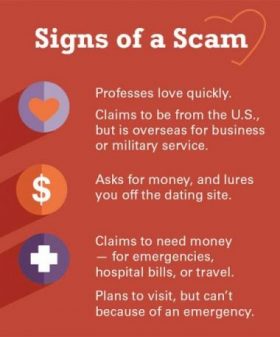It can be exciting to sign up for an online dating service for the first time. You’ll build a great profile, pour over your potential matches, and tentatively start to talk online with some of the most promising ones. While most people on these services are there to find a potential date, online dating scams are becoming a real problem. In fact, in 2015, dating scams cost unsuspecting American seniors over $190 million. Learn how to spot the warning signs of a so-called “sweetheart scam” to keep yourself safe as you find the perfect date.
Catfishing Senior Dating Scam: What is it?
Catfishing is a catch-all term for the practice of setting up fake online dating profiles to scam unsuspecting people. These phony dating profiles are often, but not always, set up by someone overseas. The profile will probably look legitimate because these scammers often steal photos and names of real people and carefully craft the profile to make it seem like a real person.
This person may contact you over messenger on the dating service, and over time you might develop feelings for them. Just when it is time for you to finally meet them in person, something will suddenly come up like a death in their family or the inability to buy a plane ticket. They may ask you to pay for it, or if they are very crafty, they’ll get you to offer without ever having to ask by playing on your emotions.
Some dating scams involve relationships that are built on phony intentions. You might meet someone and start a relationship with them, not realizing that they are really just after your money or looking to find a free caretaker. Seniors especially are at risk of scams aimed at getting ahold of their savings. It is also not unusual for older men and women to look for partners in their later years who are a bit younger and healthier than themselves. Sometimes this is totally innocuous, but occasionally it reflects an ulterior motive to have a reliable caretaker as their own health declines.
Red Flags Could be a Senior Dating Scam
Dating scams come in many forms, but here is a list of major red flags to avoid:
-
The person seems to develop very strong feelings for you very quickly; they may say they’ve fallen in love with you or can’t live without you within just a few days or weeks of online communication.
-
Their dating profile only has professional photos and/or the person is extremely attractive and often quite a bit younger than yourself.
-
They may type poorly or in broken English, even though they claim English is their first language. This is a sign that the profile might be run by a scammer located outside of the country. Of course, this is not necessarily a red flag if they tell you English is not their first language.
-
They may not agree to talk on the phone or on a video chat. This might be because they’re not who they say they are.
-
They may tell you they’ve just experienced a horrible tragedy – a layoff and loss of pension, a dramatic death in the family – and because of circumstances out of their control, don’t have the money to pay for the situation.
Tips for Senior Dating Safety

There are a few precautions you can take to help you stay safe as you navigate dating:
-
Join a reputable dating website: If you want to try out online dating, join a reputable website like SilverSingles or OurTime. Bigger sites have more resources to put toward security and profile verification and more ways for you to report suspicious behavior.
-
Never give out any personal information: This includes, but is not limited to, your full name, your address or other specifics about where you live, any information about your financial situation, or the full names of your children or friends. If you have an email address that uses your full name, be sure not to use it for your dating profile. Instead, set up another email address specifically to use for online dating and other times when you need to maintain your privacy.
-
Be an online sleuth: If your date has a dating profile, they likely have social media profiles or other online presence. Try doing an internet search for their username or phone number (and once you’ve learned it, their full name).
-
Ask to talk: Since sweetheart scammers often use stolen profile pics or are located outside the country, they typically will refuse to talk to you on the phone or over video call (like FaceTime). It’s a good idea to ask fairly early on to talk on the phone or video call.
-
Don’t fall for financial ploys: Never offer to give money, gift cards, bank account information, or any other type of financial assistance to someone you’ve met online and haven’t already built an established, trusting relationship with. It’s wise to date people who are in a similar financial situation as yourself to avoid being taken for a ride.
-
Ask questions: If the person you’re talking with online claims to be local to you, you can ask them seemingly innocent questions to test their local knowledge. If they’re not local to you, ask them why they are pursuing a long-distance relationship.
-
Listen to your friends and family: If they are getting bad vibes about someone you’ve met online, and you know they have your best interests at heart, listen to their advice.
Bottom Line
Keep in mind that the risks of online dating don’t end when you meet in person. Tell a friend where you’ll be and ask them to call to check on you around the time you expect to be home. Always meet for the first time in a public place. Don’t tell a new date where you live until they’ve earned your trust. If you drink, be careful to not consume too much alcohol on your date.


